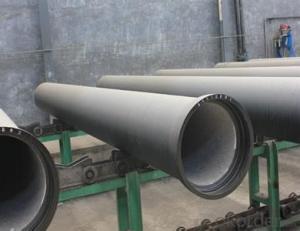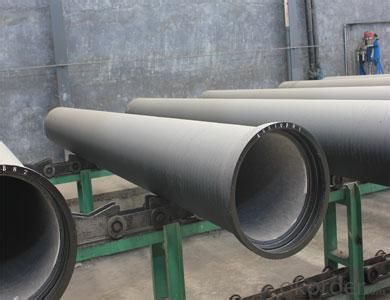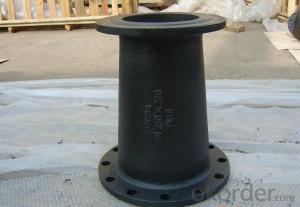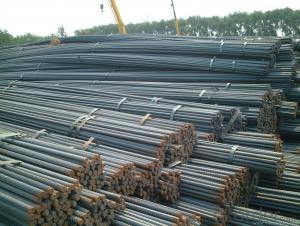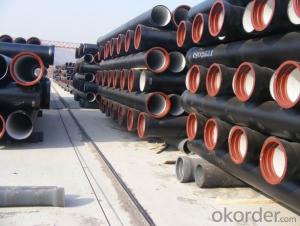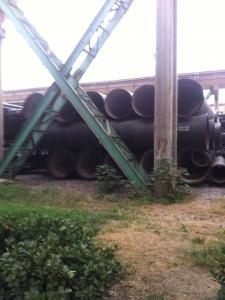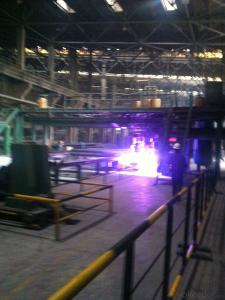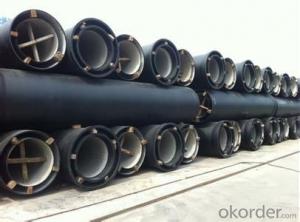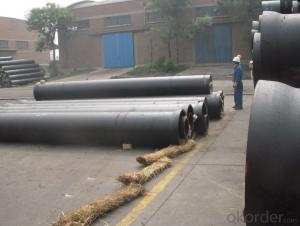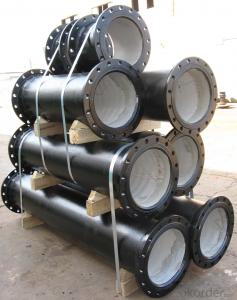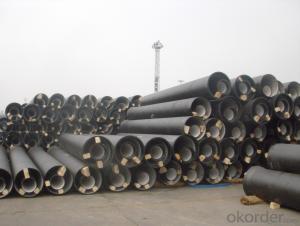DUCTILE IRON PIPES AND PIPE FITTINGS K8 CLASS DN600
- Loading Port:
- Tianjin
- Payment Terms:
- TT OR LC
- Min Order Qty:
- 22 pc
- Supply Capability:
- 3000 pc/month
OKorder Service Pledge
OKorder Financial Service
You Might Also Like
Material : Ductile Cast Iron
Size Range : DN 80mm to DN 2000mm
Unit Effective Length : 6m or 5.7m
Manufacture Standard: ISO 2531:1998/ EN 545:2006/EN 598:2007
Annual capacity : 200,000 tons
Coating Exterior: Zinc 130g/m2 according to ISO 8179-1 and bitumen coating 70 microns.
Cement Interior: Portland Cement/ High Alumina Cement/ Sulphate Resisting Cement Lining according to ISO 4179
Special requirements on external coating and internal lining can be applied
We also provide accessories such as SBR/EPDM rubber gaskets, lubricant paste, pipe caps, PE sleeves, etc.
Additional Parts:
Each pipe is strictly inspected according to related standard to ensure permanently high performance.
Easy Installation at site and service free for life
Long Service Lifespan
Quotation will arrive you within 24hours once we get your inquiry.
We guarantee offering you a competitive price.
A copy of original inspection reports of pipes will be offered after shipment.
Photos of loading process will be sent to the customer after shipment effect.
We will follow-up the delivery progress after shipment effect and update to the customer on weekly basis.
- Q: What are the typical lengths of ductile iron pipes?
- The specific project requirements and industry standards play a significant role in determining the typical lengths of ductile iron pipes. Generally, ductile iron pipes are commonly available in lengths ranging from 18 feet (5.5 meters) to 20 feet (6 meters). These lengths are well-suited for a variety of applications including water distribution, wastewater systems, and industrial pipelines. It is worth mentioning that custom lengths can also be produced to fulfill specific project requirements.
- Q: Can ductile iron pipes be used for large-scale irrigation systems?
- Yes, ductile iron pipes can be used for large-scale irrigation systems. Ductile iron pipes are known for their strength, durability, and corrosion resistance, making them suitable for various applications, including irrigation. They can handle high-pressure water flow and provide long-lasting performance, making them a reliable choice for large-scale irrigation systems.
- Q: What is the expected sound attenuation of ductile iron pipes?
- Several factors can affect the expected sound attenuation of ductile iron pipes. Generally, these pipes have good sound attenuation properties due to their dense construction and thick walls. The density of the material helps absorb and dampen sound waves, reducing noise transmission. Additionally, the thickness of the pipe walls adds an extra barrier for sound to pass through, contributing to sound attenuation. However, it's important to consider other factors that can influence the specific sound attenuation of ductile iron pipes. These factors include pipe diameter, wall thickness, installation method, and the surrounding environment. For example, larger diameter pipes may have slightly lower sound attenuation compared to smaller diameter pipes due to their increased surface area. Additionally, variations in wall thickness can affect the sound insulation properties. During installation, the presence of joints or fittings in the pipeline can create points where sound can transmit, reducing sound attenuation. Therefore, it is recommended to use proper installation techniques that minimize the use of joints and fittings to enhance sound attenuation. The surrounding environment also plays a role in sound attenuation. For instance, if the pipes are buried in soil, the composition and density of the soil can affect sound transmission properties. Moreover, the presence of other structures or materials nearby may influence the overall sound attenuation performance. To determine the specific expected sound attenuation of ductile iron pipes for a particular application, it is advisable to consult manufacturer specifications or seek assistance from acoustic engineering professionals. They can consider all relevant factors and conduct specific tests or simulations to provide accurate predictions.
- Q: Ductile iron pipe is how many years warranty
- In the ferrite and pearlite matrix on the distribution of a certain number of spheroidal graphite, according to the nominal diameter and the elongation of different microstructure of ferrite and pearlite in different proportions of small caliber pearlite percentage is generally not more than 20%, large diameter of the general control in about 25%.
- Q: How can the connection of ductile iron pipe elbow be convenient for connecting?
- Ductile cast iron pipe in the groove pipe connection technology is also called the lathedog connection technology, has become the most liquid and gas pipeline connection technology, although this technology is later than foreign in domestic development time, but because of its advanced technology, domestic market quickly received. Since 1998, it has been developed and applied in just a few years. It has gradually replaced two traditional ways of pipe connection, such as flange and welding. Not only technically more mature, the market is generally recognized, but also by the national laws and regulations actively guide the policy. The application of grooved pipe connection technology makes the complex pipe connection procedure simple, fast and convenient. Took a big step forward in pipeline connection technology.
- Q: What is the minimum operating temperature for ductile iron pipes?
- Ductile iron pipes typically have a minimum operating temperature of -40 degrees Celsius, showcasing its exceptional strength and ductility in cold conditions. This makes it a versatile option for various purposes, such as water and wastewater systems. Nevertheless, it is crucial to acknowledge that the specific minimum operating temperature may differ based on factors such as the grade of ductile iron employed and the requirements of the application. It is highly advisable to refer to the manufacturer's specifications and guidelines for the appropriate utilization and optimal performance of ductile iron pipes in cold temperatures.
- Q: Can ductile iron pipes be used for underground river crossings?
- Yes, ductile iron pipes can be used for underground river crossings. Ductile iron pipes have excellent strength and durability, making them suitable for various applications, including underground river crossings. They have high tensile strength and are resistant to corrosion and external loads, making them an ideal choice for such installations.
- Q: How much is the manual installation fee of ductile iron pipes from 100 to 150 per metre?
- DN150 ductile iron water supply pipe installation interface is not the same way, the installation of labor costs will be somewhat different
- Q: What is the expected leakage rate of ductile iron pipes?
- The expected leakage rate of ductile iron pipes can vary depending on various factors such as the age and condition of the pipes, the quality of installation, and the presence of any external factors that may impact the integrity of the pipes. However, in general, ductile iron pipes are known for their durability and low leakage rates compared to other types of pipes. According to industry standards and studies, the expected leakage rate of well-maintained and properly installed ductile iron pipes is typically less than 0.5 liters per pipe per day (LPPD). This leakage rate is considered acceptable and meets the requirements set by various regulatory bodies and organizations. It is important to note that regular maintenance and inspections are crucial in maintaining the low leakage rate of ductile iron pipes. By identifying and repairing any potential leaks or damages promptly, the overall leakage rate can be effectively minimized. Furthermore, advancements in manufacturing techniques and improvements in pipe design have led to the development of more leak-resistant ductile iron pipes. These pipes may have even lower expected leakage rates than the industry average, further enhancing their overall performance and reliability. Ultimately, while the expected leakage rate of ductile iron pipes can vary, it is generally considered to be low when properly installed and maintained, making them a reliable choice for various water distribution and transmission systems.
- Q: Can ductile iron pipes be used for irrigation systems in agricultural fields?
- Yes, ductile iron pipes can be used for irrigation systems in agricultural fields. Ductile iron pipes are known for their durability, strength, and corrosion resistance, making them a suitable choice for various applications, including irrigation systems. These pipes are capable of withstanding high pressures and can handle the demands of transporting water for irrigation purposes. Additionally, the ductile iron material is resistant to environmental factors such as UV rays, soil chemicals, and temperature fluctuations, ensuring a long lifespan for the pipes. Furthermore, ductile iron pipes have excellent flow characteristics, allowing for efficient water distribution throughout the agricultural fields. Overall, ductile iron pipes are a reliable and robust option for irrigation systems in agricultural fields, providing a sustainable and efficient solution for water distribution.
Send your message to us
DUCTILE IRON PIPES AND PIPE FITTINGS K8 CLASS DN600
- Loading Port:
- Tianjin
- Payment Terms:
- TT OR LC
- Min Order Qty:
- 22 pc
- Supply Capability:
- 3000 pc/month
OKorder Service Pledge
OKorder Financial Service
Similar products
Hot products
Hot Searches
Related keywords
